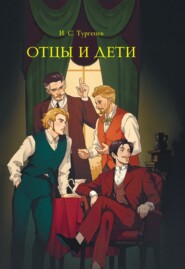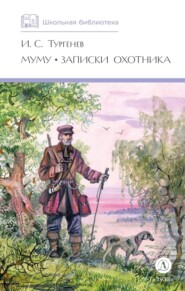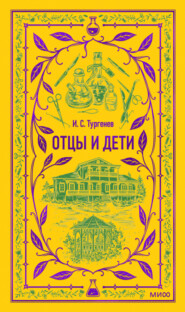По всем вопросам обращайтесь на: info@litportal.ru
(©) 2003-2024.
✖
Annouchka: A Tale
Настройки чтения
Размер шрифта
Высота строк
Поля
Gaguine stopped me with a look.
"You are not going to imagine that she is not my sister?" he replied, without paying any attention to my embarrassment. "Yes, she is indeed the daughter of my father. Give me your attention. I have confidence in you and am going to tell you everything.
"My father was an excellent man, having intelligence and a cultivated mind, but whose life was nevertheless very sad. It was not that he was more ill-used by fortune than any one else, but he had not the strength to bear a first misfortune. While still young he had made a love marriage; his wife, who was my mother, did not live long; I was only six months old when she died. My father then took me into the country, and for twelve years did not put foot outside of his domain. He himself began my education, and would never have separated himself from me if his brother, my paternal uncle, had not come to see him on his estate. This uncle lived at Petersburg, and he held an important position there. He succeeded in persuading my father to confide me to his care, so that he would never need to leave his estate; he represented to him that isolation was injurious to a boy already grown, and who in the hands of a preceptor as sad and stern as my father would be far behind children of my own age, and that even my character would suffer.
"My father resisted his attempts for a long time, but finally yielded. I cried on being separated from him, for I loved him, though I had never seen a smile upon his lips. Arrived at Petersburg, I soon forgot the sad, dark place where my infancy was passed. I entered the military school, then a regiment of the Guard. I went every year to pass some weeks in the country. Each time I found my father more morose, more reserved and pensive, until at times he became fierce. He went every day to church, and almost entirely lost the habit of talking.
"During one of these visits (I was about twenty years of age) I perceived for the first time a slight girl with black eyes, about twelve years old; it was Annouchka. My father told me she was an orphan whom he took care of, and I paid but little attention to this child, wild, silent, and active as a young fallow deer. When I entered my father's favorite room, the vast chamber where my mother died, and so dark that they kept it lighted in broad day, Annouchka hid herself behind a large arm-chair or the bookcase. It happened that for three or four days after this last visit I was prevented by my duties from returning to my father's, but every month I received a few lines from his hand, in which he rarely spoke of Annouchka, and always without going into any details of the subject. He was already over fifty, but appeared still a young man. You may imagine the shock when I suddenly received a letter from our steward, in which he announced to me that my father was dangerously ill, and implored me to come as soon as possible if I wished to see him before he died.
"I started immediately, and travelled with the greatest speed, and found my father still living, but just about to breathe his last. He was delighted to see me again, and clasped me in his emaciated arms, fastening his glance upon me, which appeared at once to fathom my thoughts and to address me a mute prayer, and making me promise to fulfil his last wish, he ordered his old valet to bring Annouchka into his room.
"The old man led her in; she could hardly stand, trembling all over.
"'Now,' said my father with an effort, 'I confide to your care my daughter, your sister; Iskof will relate everything to you,' he added, designating his old servant.
"Annouchka began to sob and fell upon the bed, hiding her face. Half an hour after, my father expired.
"This is what I learned: Annouchka was the daughter of my father and of an old waiting maid of my mother, named Tatiana. I recollect Tatiana very well. She was tall, with large, dark eyes, noble, severe, and intelligent features, and passed for a proud girl, rather unapproachable. As far as I could understand by the simple story with respectful omissions that Iskof related, my father did not notice Tatiana until several years after the death of my mother. At that time Tatiana no longer lived in the manor-house, but with one of her married sisters, charged with looking after the courtyard. My father had taken a fancy to her, and when I left the country he even thought of marrying her, but she resisted all his entreaties. 'The dead Tatiana Vlassievna,' said Iskof, standing reverentially near the door, his hands behind his back, 'was a person of great good judgment; she did not wish to bring prejudice against your father,' – 'I become your wife, mistress here, you can't think of it?' she cried, thus addressing your father in my presence." Inflexible upon this point, Tatiana would not even change her abode; she continued to live at her sister's with Annouchka. When I was a child I often remember having seen Tatiana on fête-days at church. A dark handkerchief on her head, a yellow shawl thrown over her shoulder, she stood with the other villagers near a window. Her stern profile stood out clearly against the panes, and she prayed with modest gravity, bowing profoundly after the custom of the old time, and touching the earth with the end of her fingers before touching it with her forehead.
"At the time my uncle took me away, little Annouchka was only two years old; she was nine when she lost her mother. After the death of Tatiana, my father took the child to his own house. Already he had several times expressed a wish to do so, but Tatiana was always opposed to it. You may imagine what Annouchka must have felt when she found herself established in the house of him they called "the master." Even to the present time she preserves the remembrance of the day when for the first time she put on a silk dress, and they made her kiss his hand. Her mother had brought her up with severity; my father did not place the least restraint upon her. He charged himself with her education; she had no other master. He did not spoil her, or load her with useless tasks. He loved her ardently; he could refuse her nothing. Annouchka soon learned that she was the principal personage of the house; she knew that the master was her father; even then she had a feeling of her false position, and an amour propre unhealthful and full of mistrust sprang up in her. Some bad habits took root; her naïveté disappeared; she wished, she confided to me later, to force the whole world to forget her origin. At times she blushed at it; then, ashamed at her blushes, she showed that she was proud of her mother. You see that she knew, and knows still, a great many things which she should have been ignorant of at her age; but whose fault was it? The passion of youth burst forth impetuously, and there was no friendly hand to direct her. It is so difficult to make good use of such entire independence. So, not wishing to be behind other nobles' daughters, she devoted herself to reading; but what profit could she derive from it? Her life, begun in a false way, remained so, but her heart kept pure.
"At this time I was but twenty years of age, and charged with the care of a young girl of thirteen. For the first few days after my father's death the sound of my voice was sufficient to throw her into a fever. My caresses caused her agony; it was but gradually and almost insensibly that she became accustomed to me. It is true that later, when she saw that I was thoughtful of her, and loved her as a sister, she became ardently attached to me; she could feel nothing half way.
"I took her to Petersburg, and though hard for me to leave her, it not being in my power to keep her near me, I placed her in one of the best boarding-schools of the city. Annouchka understood the necessity of this separation, but she fell ill and nearly died. Later she became accustomed to this kind of life. She remained at boarding-school four years, and, contrary to my expectation, she came out nearly the same as she went in. The mistress of the boarding-school often complained of her. "Punishments have no effect upon her," she told me, "and marks of affection find her equally insensible." Annouchka was very intelligent; she studied hard, and in this respect led all her companions; but nothing could make her comply with the ordinary rules, – she remained obstinate, and with an unsociable humor. I do not blame her entirely; she was in a position where there were but two ways of acting open to her, – a complacent servility or a proud shyness. Among all her schoolmates, she was intimate with but one, a young girl, quite plain, poor, and persecuted. The other scholars of the boarding-school, most of them of the aristocracy, did not like her, and pursued her with their sarcasms. Annouchka kept aloof from them in every way. One day the priest charged with their religious instruction spoke of the faults of youth; Annouchka said aloud: "There are no greater faults than flattery and meanness." In a word, her character did not change, only her manners improved, although there was still much to be desired.
"So she reached her seventeenth year. My position was quite embarrassing; but a happy thought suddenly occurred to me: it was to leave the service, pass three or four years in a strange country and take my sister with me. As soon as I conceived this resolution I put it in execution, and that is why you find us both upon the banks of the Rhine, I attempting to paint, and she doing anything she wishes, according to her fancy. Now I hope that you will not judge her too severely, for I warn you that Annouchka, though pretending to care nothing about it, is very sensitive to the opinion that others have of her, and to yours above all."
As he said these last words, Gaguine smiled with his usual calmness. I pressed his hand with warmth.
"All this is nothing," he replied, "but I tremble for her in the future. She has one of the most inflammable natures. Up to the present time no one has pleased her; but if she ever loves, who can tell what may result from it? I do not at times know how to behave towards her. Imagine those days when she wished to prove to me that I was cool towards her, whilst she loved only me, and would never love another man! and while saying this she would weep bitterly.
"It is for this reason then? – " I began to say, but I immediately stopped myself.
"Since we are in the chapter of confidences," I replied, "allow me one question. Is it true that no one has pleased her up to the present time? Yet at Petersburg she must have seen a great many young people?"
"They were all to the highest degree displeasing to her. You see, Annouchka was seeking for a hero, an extraordinary man, or some handsome shepherd living in a mountain cave. But it is time for me to stop; I detain you," added he, rising.
"No," I said to him, "let us rather go to your house. I don't wish to go into the house."
"And your work?" he asked of me.
I did not reply to him. Gaguine kindly smiled, and we returned to L. In again seeing the vineyard and the white house on the mountain, I felt a peculiarly sweet emotion that penetrated my soul; it was as if balm had been poured into my heart.
Gaguine's story relieved me greatly.
IX
Annouchka came to meet us at the threshold of the door. I was expecting a fresh burst of laughter, but she approached us pale, silent, her eyes cast down.
"I have brought him back," said Gaguine, "and it is well to add that he wished to come himself."
She looked at me with a questioning air. I put my hand out to her this time, and pressed with fervor her cold and trembling fingers. I felt a profound pity for her. I understood, indeed, the sides of her character which had appeared inexplicable to me. That agitation one saw in her, that desire of putting herself forward, joined with the fear of appearing ridiculous, was quite clear to me now.
A weighty secret oppressed her constantly, her inexperienced amour propre came forward and receded incessantly, but her whole being sought the truth. I understood what attracted me towards this strange young girl: it was not only the half-savage charm bestowed upon her lovely and graceful young figure, it was also her soul that captivated me. Gaguine began to rummage over his portfolios; I proposed to Annouchka to accompany me into the vineyard. She immediately consented, with a gay and almost submissive air. We went half way down the mountain, and seated ourselves upon a stone.
"And you were not dull without us?" she asked me.
"You were then dull without me?" I replied to her.
Annouchka looked at me slyly.
"Yes!" she said, and almost immediately began, —
"The mountains must be very beautiful. They are high, higher than the clouds. Tell me what you saw. You have already told my brother, but I have not heard."
"But you did not care to hear, since you went out."
"I went out because, – you see very well that I don't go out now," added she in a tender tone; "but this morning you were angry."
"I was angry?"
"Yes!"
"Come now, why should I have been?"
"I don't know; but you were angry, and went away in the same mood. I was very sorry to see you go away so, and I am glad to see you come back."
"And I am very glad to be back," I answered.
Annouchka shrugged her shoulders, as children do when they are pleased. "Oh! I know it," she replied. "I used to know by the way in which my father coughed whether he was pleased with me or not."
It was the first time that she had spoken of her father; it surprised me.
"You loved your father very much?" I asked her; and suddenly, to my great disgust, I felt that I blushed.
She did not answer, and blushed also.
We kept silent for some time. In the distance the smoke of a steamboat rose up on the Rhine; we followed it with our eyes.
"And your story," she said to me in a low voice.
"Why did you sometimes begin to laugh when you saw me?" I asked her.
"I don't know. Sometimes I feel like weeping, and I begin to laugh. You must not judge of me by the way I act. Apropos, what is that legend about the fairy Lorelei? This is her rock that one sees here. They say that formerly she drowned everybody, until, falling in love, she threw herself into the Rhine. I like the story. Dame Louise knows a great many of them; she tells them all to me. Dame Louise has a black cat with yellow eyes."
Annouchka raised her head and shook her curls.
"Ah! how happy I am," she said. At that moment low, monotonous sounds began to be heard at intervals, – hundreds of voices, chanting in chorus, with cadenced interruptions, a religious song. A long procession appeared on the road below us, with crosses and banners.
"You are not going to imagine that she is not my sister?" he replied, without paying any attention to my embarrassment. "Yes, she is indeed the daughter of my father. Give me your attention. I have confidence in you and am going to tell you everything.
"My father was an excellent man, having intelligence and a cultivated mind, but whose life was nevertheless very sad. It was not that he was more ill-used by fortune than any one else, but he had not the strength to bear a first misfortune. While still young he had made a love marriage; his wife, who was my mother, did not live long; I was only six months old when she died. My father then took me into the country, and for twelve years did not put foot outside of his domain. He himself began my education, and would never have separated himself from me if his brother, my paternal uncle, had not come to see him on his estate. This uncle lived at Petersburg, and he held an important position there. He succeeded in persuading my father to confide me to his care, so that he would never need to leave his estate; he represented to him that isolation was injurious to a boy already grown, and who in the hands of a preceptor as sad and stern as my father would be far behind children of my own age, and that even my character would suffer.
"My father resisted his attempts for a long time, but finally yielded. I cried on being separated from him, for I loved him, though I had never seen a smile upon his lips. Arrived at Petersburg, I soon forgot the sad, dark place where my infancy was passed. I entered the military school, then a regiment of the Guard. I went every year to pass some weeks in the country. Each time I found my father more morose, more reserved and pensive, until at times he became fierce. He went every day to church, and almost entirely lost the habit of talking.
"During one of these visits (I was about twenty years of age) I perceived for the first time a slight girl with black eyes, about twelve years old; it was Annouchka. My father told me she was an orphan whom he took care of, and I paid but little attention to this child, wild, silent, and active as a young fallow deer. When I entered my father's favorite room, the vast chamber where my mother died, and so dark that they kept it lighted in broad day, Annouchka hid herself behind a large arm-chair or the bookcase. It happened that for three or four days after this last visit I was prevented by my duties from returning to my father's, but every month I received a few lines from his hand, in which he rarely spoke of Annouchka, and always without going into any details of the subject. He was already over fifty, but appeared still a young man. You may imagine the shock when I suddenly received a letter from our steward, in which he announced to me that my father was dangerously ill, and implored me to come as soon as possible if I wished to see him before he died.
"I started immediately, and travelled with the greatest speed, and found my father still living, but just about to breathe his last. He was delighted to see me again, and clasped me in his emaciated arms, fastening his glance upon me, which appeared at once to fathom my thoughts and to address me a mute prayer, and making me promise to fulfil his last wish, he ordered his old valet to bring Annouchka into his room.
"The old man led her in; she could hardly stand, trembling all over.
"'Now,' said my father with an effort, 'I confide to your care my daughter, your sister; Iskof will relate everything to you,' he added, designating his old servant.
"Annouchka began to sob and fell upon the bed, hiding her face. Half an hour after, my father expired.
"This is what I learned: Annouchka was the daughter of my father and of an old waiting maid of my mother, named Tatiana. I recollect Tatiana very well. She was tall, with large, dark eyes, noble, severe, and intelligent features, and passed for a proud girl, rather unapproachable. As far as I could understand by the simple story with respectful omissions that Iskof related, my father did not notice Tatiana until several years after the death of my mother. At that time Tatiana no longer lived in the manor-house, but with one of her married sisters, charged with looking after the courtyard. My father had taken a fancy to her, and when I left the country he even thought of marrying her, but she resisted all his entreaties. 'The dead Tatiana Vlassievna,' said Iskof, standing reverentially near the door, his hands behind his back, 'was a person of great good judgment; she did not wish to bring prejudice against your father,' – 'I become your wife, mistress here, you can't think of it?' she cried, thus addressing your father in my presence." Inflexible upon this point, Tatiana would not even change her abode; she continued to live at her sister's with Annouchka. When I was a child I often remember having seen Tatiana on fête-days at church. A dark handkerchief on her head, a yellow shawl thrown over her shoulder, she stood with the other villagers near a window. Her stern profile stood out clearly against the panes, and she prayed with modest gravity, bowing profoundly after the custom of the old time, and touching the earth with the end of her fingers before touching it with her forehead.
"At the time my uncle took me away, little Annouchka was only two years old; she was nine when she lost her mother. After the death of Tatiana, my father took the child to his own house. Already he had several times expressed a wish to do so, but Tatiana was always opposed to it. You may imagine what Annouchka must have felt when she found herself established in the house of him they called "the master." Even to the present time she preserves the remembrance of the day when for the first time she put on a silk dress, and they made her kiss his hand. Her mother had brought her up with severity; my father did not place the least restraint upon her. He charged himself with her education; she had no other master. He did not spoil her, or load her with useless tasks. He loved her ardently; he could refuse her nothing. Annouchka soon learned that she was the principal personage of the house; she knew that the master was her father; even then she had a feeling of her false position, and an amour propre unhealthful and full of mistrust sprang up in her. Some bad habits took root; her naïveté disappeared; she wished, she confided to me later, to force the whole world to forget her origin. At times she blushed at it; then, ashamed at her blushes, she showed that she was proud of her mother. You see that she knew, and knows still, a great many things which she should have been ignorant of at her age; but whose fault was it? The passion of youth burst forth impetuously, and there was no friendly hand to direct her. It is so difficult to make good use of such entire independence. So, not wishing to be behind other nobles' daughters, she devoted herself to reading; but what profit could she derive from it? Her life, begun in a false way, remained so, but her heart kept pure.
"At this time I was but twenty years of age, and charged with the care of a young girl of thirteen. For the first few days after my father's death the sound of my voice was sufficient to throw her into a fever. My caresses caused her agony; it was but gradually and almost insensibly that she became accustomed to me. It is true that later, when she saw that I was thoughtful of her, and loved her as a sister, she became ardently attached to me; she could feel nothing half way.
"I took her to Petersburg, and though hard for me to leave her, it not being in my power to keep her near me, I placed her in one of the best boarding-schools of the city. Annouchka understood the necessity of this separation, but she fell ill and nearly died. Later she became accustomed to this kind of life. She remained at boarding-school four years, and, contrary to my expectation, she came out nearly the same as she went in. The mistress of the boarding-school often complained of her. "Punishments have no effect upon her," she told me, "and marks of affection find her equally insensible." Annouchka was very intelligent; she studied hard, and in this respect led all her companions; but nothing could make her comply with the ordinary rules, – she remained obstinate, and with an unsociable humor. I do not blame her entirely; she was in a position where there were but two ways of acting open to her, – a complacent servility or a proud shyness. Among all her schoolmates, she was intimate with but one, a young girl, quite plain, poor, and persecuted. The other scholars of the boarding-school, most of them of the aristocracy, did not like her, and pursued her with their sarcasms. Annouchka kept aloof from them in every way. One day the priest charged with their religious instruction spoke of the faults of youth; Annouchka said aloud: "There are no greater faults than flattery and meanness." In a word, her character did not change, only her manners improved, although there was still much to be desired.
"So she reached her seventeenth year. My position was quite embarrassing; but a happy thought suddenly occurred to me: it was to leave the service, pass three or four years in a strange country and take my sister with me. As soon as I conceived this resolution I put it in execution, and that is why you find us both upon the banks of the Rhine, I attempting to paint, and she doing anything she wishes, according to her fancy. Now I hope that you will not judge her too severely, for I warn you that Annouchka, though pretending to care nothing about it, is very sensitive to the opinion that others have of her, and to yours above all."
As he said these last words, Gaguine smiled with his usual calmness. I pressed his hand with warmth.
"All this is nothing," he replied, "but I tremble for her in the future. She has one of the most inflammable natures. Up to the present time no one has pleased her; but if she ever loves, who can tell what may result from it? I do not at times know how to behave towards her. Imagine those days when she wished to prove to me that I was cool towards her, whilst she loved only me, and would never love another man! and while saying this she would weep bitterly.
"It is for this reason then? – " I began to say, but I immediately stopped myself.
"Since we are in the chapter of confidences," I replied, "allow me one question. Is it true that no one has pleased her up to the present time? Yet at Petersburg she must have seen a great many young people?"
"They were all to the highest degree displeasing to her. You see, Annouchka was seeking for a hero, an extraordinary man, or some handsome shepherd living in a mountain cave. But it is time for me to stop; I detain you," added he, rising.
"No," I said to him, "let us rather go to your house. I don't wish to go into the house."
"And your work?" he asked of me.
I did not reply to him. Gaguine kindly smiled, and we returned to L. In again seeing the vineyard and the white house on the mountain, I felt a peculiarly sweet emotion that penetrated my soul; it was as if balm had been poured into my heart.
Gaguine's story relieved me greatly.
IX
Annouchka came to meet us at the threshold of the door. I was expecting a fresh burst of laughter, but she approached us pale, silent, her eyes cast down.
"I have brought him back," said Gaguine, "and it is well to add that he wished to come himself."
She looked at me with a questioning air. I put my hand out to her this time, and pressed with fervor her cold and trembling fingers. I felt a profound pity for her. I understood, indeed, the sides of her character which had appeared inexplicable to me. That agitation one saw in her, that desire of putting herself forward, joined with the fear of appearing ridiculous, was quite clear to me now.
A weighty secret oppressed her constantly, her inexperienced amour propre came forward and receded incessantly, but her whole being sought the truth. I understood what attracted me towards this strange young girl: it was not only the half-savage charm bestowed upon her lovely and graceful young figure, it was also her soul that captivated me. Gaguine began to rummage over his portfolios; I proposed to Annouchka to accompany me into the vineyard. She immediately consented, with a gay and almost submissive air. We went half way down the mountain, and seated ourselves upon a stone.
"And you were not dull without us?" she asked me.
"You were then dull without me?" I replied to her.
Annouchka looked at me slyly.
"Yes!" she said, and almost immediately began, —
"The mountains must be very beautiful. They are high, higher than the clouds. Tell me what you saw. You have already told my brother, but I have not heard."
"But you did not care to hear, since you went out."
"I went out because, – you see very well that I don't go out now," added she in a tender tone; "but this morning you were angry."
"I was angry?"
"Yes!"
"Come now, why should I have been?"
"I don't know; but you were angry, and went away in the same mood. I was very sorry to see you go away so, and I am glad to see you come back."
"And I am very glad to be back," I answered.
Annouchka shrugged her shoulders, as children do when they are pleased. "Oh! I know it," she replied. "I used to know by the way in which my father coughed whether he was pleased with me or not."
It was the first time that she had spoken of her father; it surprised me.
"You loved your father very much?" I asked her; and suddenly, to my great disgust, I felt that I blushed.
She did not answer, and blushed also.
We kept silent for some time. In the distance the smoke of a steamboat rose up on the Rhine; we followed it with our eyes.
"And your story," she said to me in a low voice.
"Why did you sometimes begin to laugh when you saw me?" I asked her.
"I don't know. Sometimes I feel like weeping, and I begin to laugh. You must not judge of me by the way I act. Apropos, what is that legend about the fairy Lorelei? This is her rock that one sees here. They say that formerly she drowned everybody, until, falling in love, she threw herself into the Rhine. I like the story. Dame Louise knows a great many of them; she tells them all to me. Dame Louise has a black cat with yellow eyes."
Annouchka raised her head and shook her curls.
"Ah! how happy I am," she said. At that moment low, monotonous sounds began to be heard at intervals, – hundreds of voices, chanting in chorus, with cadenced interruptions, a religious song. A long procession appeared on the road below us, with crosses and banners.

















